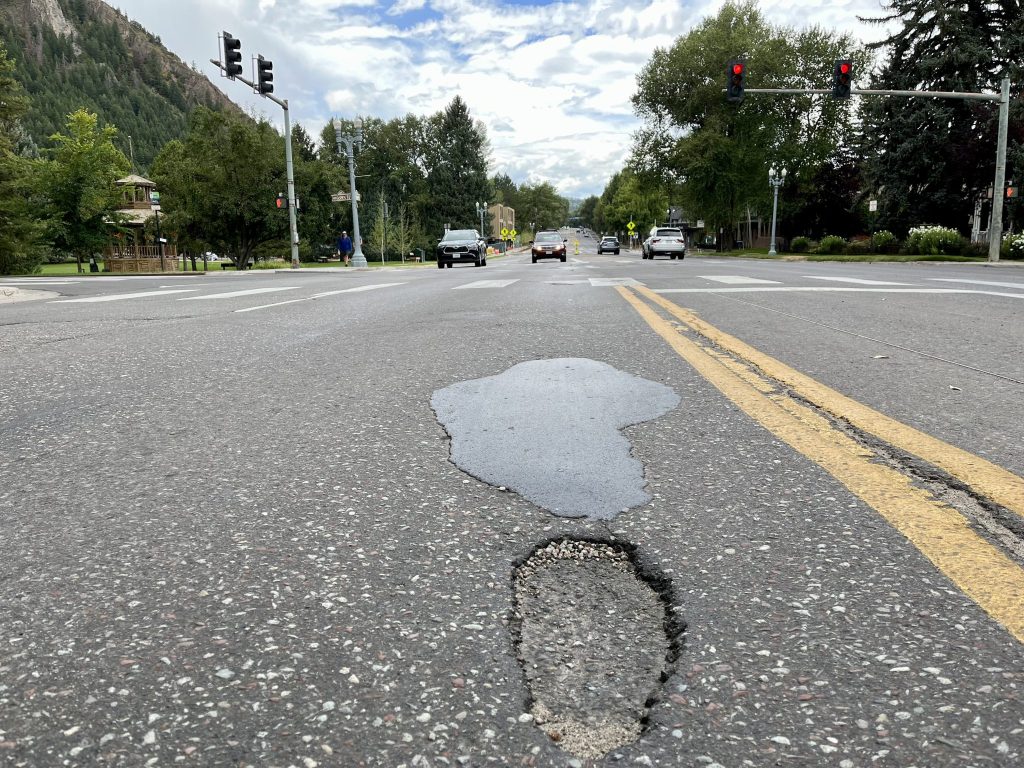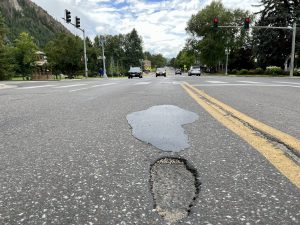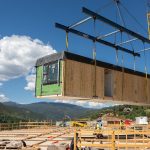Civil engineers give Colorado a C-minus grade on infrastructure report card, with roads and schools receiving low marks
The American Society of Civil Engineers infrastructure report card for Colorado gave the state’s roads and schools low D-plus grades

Aspen Times File photo
Colorado’s infrastructure systems remain adequate but roads, schools and other aging assets require urgent attention, according to a report published by civil engineers.
The state’s infrastructure received an overall grade of C-minus on the 2025 Report Card for Colorado’s Infrastructure published Wednesday by the American Society of Civil Engineers. That is one step below the national average grade of C.
“Colorado’s infrastructure is at a critical crossroads,” the report states. “As the state’s population continues to grow and climate-related challenges intensify, the systems that support daily life, from clean water and safe roads to reliable energy and resilient parks, are under increasing strain.”
The American Society of Civil Engineers publishes national and state report cards about every four years. To compile the report cards, civil engineers analyze and grade infrastructure in each state across 14 categories. Colorado’s overall grade did not change between 2020 and 2025.
The overall C-minus grade “reflects a system that is largely functioning but shows signs of distress,” the report states. Many of Colorado’s assets are aging, underfunded, vulnerable to extreme weather and wildfires, and facing increased pressure from the state’s growing population, according to the analysis by civil engineers.
Colorado improved its grades on dams and wastewater in the most recent report card, while it saw grades drop for aviation, energy and roads, according to the report. The highest grades Colorado received in the report were B-minuses on aviation, dams and railways, while the lowest grades were D-pluses for roads and schools.
For each category of infrastructure, the report states that a team of civil engineers analyzed the infrastructure based on eight criteria: capacity, condition, funding, future need, operations, public safety, resilience and innovation.
The infrastructure report card recognized that Colorado’s Taxpayer Bill of Rights, or TABOR, limits the ability of state and local governments to increase public funding. Therefore, the civil engineers recommended “clear communication with residents” to “build mutual trust between government entities and the public,” according to the report.
To raise its grade in future report cards, the civil engineers also recommend that Colorado invest in asset management by planning for the full life cycle of infrastructure projects at their inception, including future maintenance needs.
“Our report finds that state leadership, agencies and the private sector are working admirably to keep these systems in good standing,” said T. Deniz Uludag, the society’s report card chair, in a statement. “But we are up against a mountain of external stressors and must double down on these efforts to ensure Coloradans have a built environment they can rely on.”
Here’s how civil engineers graded Colorado’s infrastructure:
Aviation: B-minus
The B-minus grade that Colorado’s aviation infrastructure received was well above the national average of a D-plus.
Colorado’s aviation network of 66 public-use airports generates $71 billion in annual business revenue to the state and supports more than 350,000 jobs, according to the report card. Denver International Airport accounts for over half of that, adding about $45 billion of the total annual business revenue and supporting more than 240,000 jobs, the report states.
But Denver International Airport “has strained capacity” that led civil engineers to drop its grade from a B in 2021 to a B-minus in the 2025 report card. The airport, designed to service 50 million passengers annually, saw more than 82 million passengers in 2024, according to the report. The report card notes that Denver International Airport has set the goal to improve facilities to be able to service 100 million passengers annually.
Roads: D-plus
Civil engineers gave Colorado’s roads a D-plus in the 2025 report card, one step above the D grade the nation’s roads received as a whole.
Only 34% of Colorado’s roads are in good condition, compared to 45% nationally, the report states. Civil engineers wrote in the report that “Colorado has some of the costliest maintenance challenges in the country” due to mountainous terrain and extreme weather.
With Colorado’s population growing 39% since 2000, the state’s roads have experienced increased congestion, the report states. About one-fourth of locally and state-maintained roads and highways are in poor condition, according to the report, which cites “inadequate state and local funding” as contributing to the problem.
Schools: D-plus
Colorado’s schools received a D-plus grade — tied with the national average — for schools.
With an average age of 41-years-old, Colorado’s schools are aging and require significant repairs estimated to be over $13.5 billion, according to the report card. Funding remains a significant challenge, with Colorado ranking 33rd in the nation for per-pupil spending, the report states.
Energy: C
Colorado received a C for its energy infrastructure, higher than the national average of D-minus.
While renewable resources now make up 41% of the state’s electricity, the report states that “inefficient energy storage capacity threatens reliability.” The report card also cites “aging assets” and “climate-driven disruptions” as potential risks to the state’s energy systems.
“Utilities are proactively investing billions in transmission upgrades, wildfire mitigation, and renewable integration,” the report states. “Yet, significant additional resources and strategic planning are essential to safeguard Colorado’s energy future.”
Drinking water: C-minus
Civil engineers gave Colorado’s drinking water infrastructure a C-minus, which is tied with the grade the nation received as a whole.
Aging infrastructure, population growth and climate-related stresses are impacting the state’s drinking water, according to the report card. The Colorado Water Plan anticipates that by 2050 there will be an annual water supply gap to approximately 250,000 households.
Many of the state’s more than 2,000 public drinking water systems are over 50 years old, the report states. The Environmental Protection Agency estimates that the state needs more than $10 billion in upgrades over the next decade to maintain and improve these systems.
New non-stop flight coming to Aspen in December
Starting in mid-December and running through early April, people will be able to fly the longest nonstop flight into Aspen from Charlotte, North Carolina.










